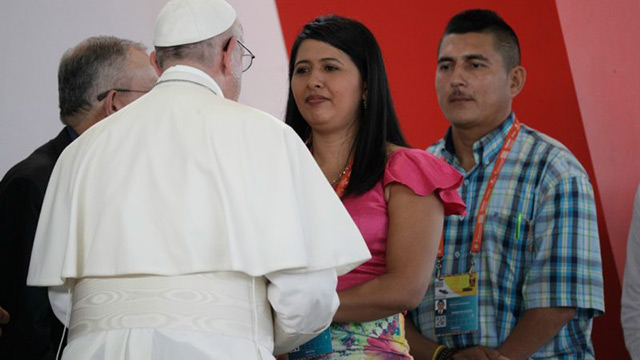Pope Francis challenges Colombians to build peaceful future

Pope Francis
(Vatican Radio) Pope Francis has concluded his visit to Colombia where he spent five days meeting victims of the country's civil war and urging all people to work together for peace and national reconciliation.
But as the spotlight fades and organisers dismantle the Mass venues, what effect will the pope's words have on the politicians, religious leaders and Colombians from all walks of life who flocked to see and hear him speak in Cartagena, Medellin, Villavicencio and the capital, Bogotà?
Beatrice Canal, a professional translator and mother of two grown up children, shares her own reactions to the papal visit.
Beatrice says she was "pleasantly surprised" and deeply moved to see so many people welcoming the pope "with happiness in their eyes".
The visit, she says, "has brought us together" and "touched the hearts of every Colombian" who had the chance to see him at the main events or simply line the streets as he drove by.
Colombians very touched by visit
She says she was happy to see that the trip was "completely unpolitical", but as an overwhelmingly Catholic nation (over 80 percent of the population) "we were very touched by the visit".
In particular, Beatrice says, Colombians are "all very happy that he is the first Latin American pope and "we see him as one of our own".
Desire to reach out to others
Asked what impact the papal visit may have on the future of her country, Beatrice notes the pope spoke extensively "about peace and reaching out to others". She adds: "I hope he leaves behind the desire in every Colombian to again feel and share that brotherly and fraternal love he's been speaking so much about".
People want to live in peace
While she acknowledges that the implementation of the peace agreements remains fraught with difficulties, Beatrice insists that "every Colombian is hopeful to live in a country in peace".
Learn to accept former insurgents
She notes that her own children, aged 30 and 35, have never lived in a country in peace, and that she was "a little girl when the violence broke out". She says: "I know that the signing of a paper does not translate immediately into peace, now comes the most difficult part where every Colombian has to chip into the process and to open our hearts and be accepting of the former insurgents".
Victims need to live without fear
Also the victims, she concludes, need to "find a place in their heart to want to forgive" and to be able to live, free of the fear that has caused so much suffering for those living the countryside.

Comment
0 Comment
Add new comment